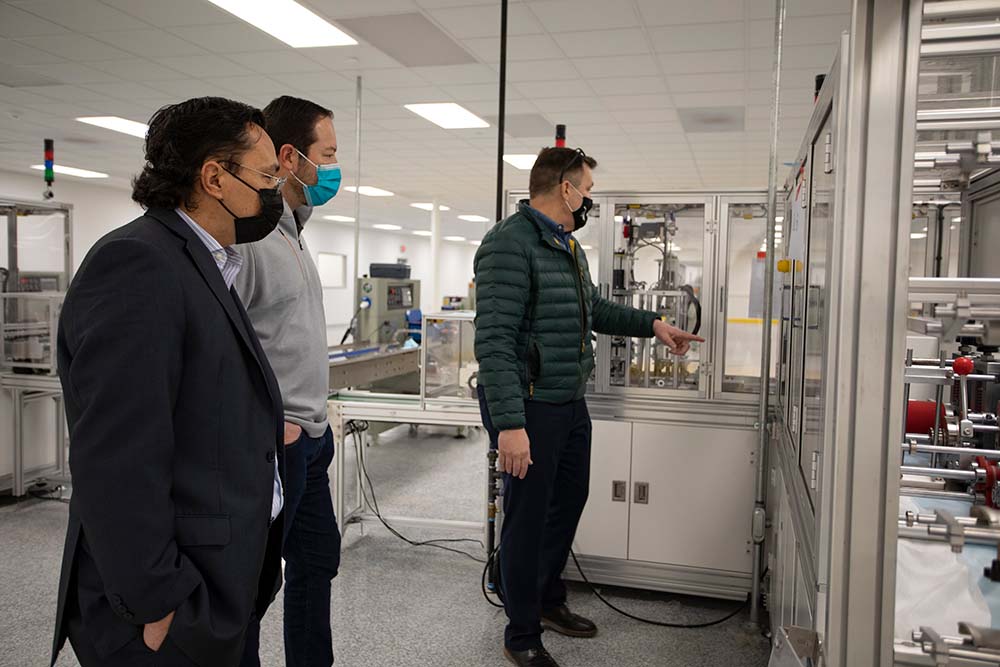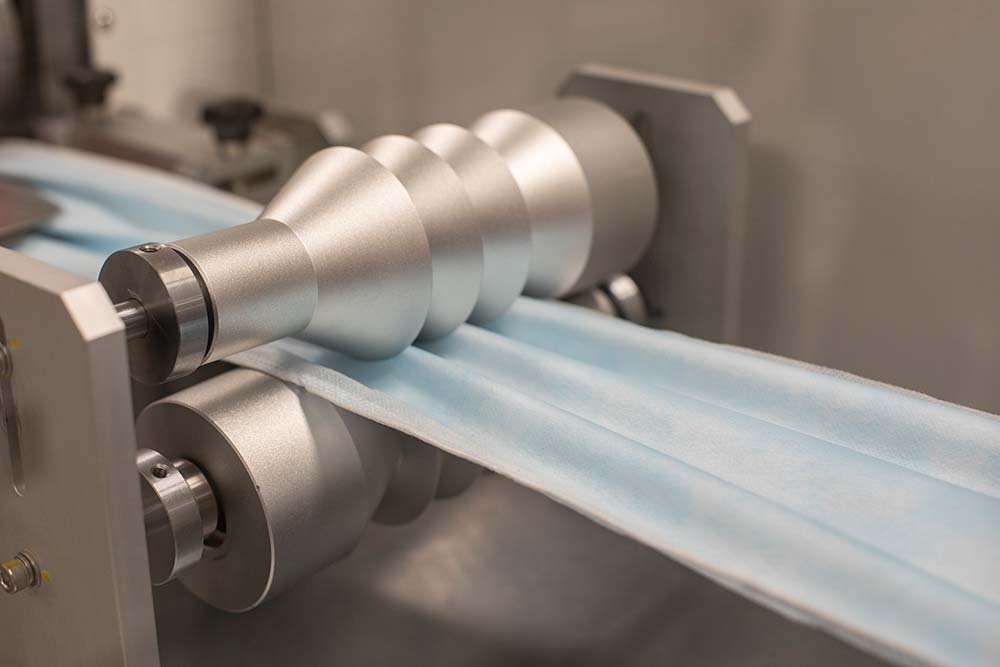
- Details
- By Jenna Kunze
In early September, when a shortage of medical masks to prevent the spread of Covid-19 swept the country, the Cherokee Nation decided it was time to make its own.
“We felt we needed to help try to fill that gap,” Cherokee Nation Chief of Staff Todd Enlow told Native News Online. “One of the things we looked at was face mask production.
Beginning in March, the Cherokee Nation will open two factories — one renovated, one newly built — that will enable it to produce between 100,000 to 200,000 masks a day. Using special machines purchased from overseas, the Cherokee Nation will manufacture N95, N99 and three-ply surgical masks. The company doesn’t yet have a name for the manufacturing entity, Enlow said.
Cherokee Nation will be among few manufacturers in the country to make N99 masks, a medical-grade mask the tribe anticipates will be the adopted standard of the future, according to Enlow.
N95 is the current adopted standard mask that healthcare professionals use to filter out 95 percent of airborne particles, as opposed to the more stringent N99 that filters 99 percent of airborne particles. Three-ply surgical masks filter less than the N95 masks, and are more commonly worn by individuals.
“There’s still going to be use and need for all three based on the individuals using them, that’s why we looked at manufacturing all three,” Enlow said.
Initially, the production will supply masks to the tribal health care workers and patients. Last year, the tribe’s clinics and hospital saw 1.4 million patients, Enlow said.
Masks will also be distributed for free throughout Cherokee Nation schools and community centers for essential workers and at-risk tribal members.
 Courtesy photo.
Courtesy photo.
While it’s not yet clear how the rollout will happen outside of the Cherokee Nation, Enlow anticipates the tribe will make available its surplus of masks to other federally recognized tribes, and pursue partnering with the federal government to sell masks to other states in need.
“By investing in our own PPE manufacturing facilities, it is another step of sustainability by our tribe through this pandemic,” Cherokee Nation Principal Chief Chuck Hoskin Jr. said. “We create jobs for our citizens and ensure we are never faced with a shortage of vital safety COVID equipment, and helps our sister tribes know they too can rely on us to have PPE masks in ready supply should they need them.”
The two factories — a 27,000-square-foot building in Stilwell, Okla. that formerly housed a Walmart retail store, and a smaller 6,000-square-foot facility constructed by the Cherokee Nation 30 minutes away in Hulbert, Okla. — will house a total of 12 mask-making machines. The tribe funded the two factory projects, equipment and materials for the tribe’s yearlong supply of masks for employees, citizens and donated masks to area schools and first responders with $38 million in federal CARES Act monies, Enlow said.
Cherokee Nation began advertising open positions at the plants this week. The tribe is looking to fill 30 positions, including for inventory management, distribution, machine operation and mechanical engineering. Enlow said the hiring process will prioritize tribal citizens.
The new endeavour represents a continued commitment to protecting Cherokee tribal citizens against the pandemic. Despite surging death rates in Oklahoma and the virus’s greater effects on Indigenous citizens by as great as 3.5 times that of white counterparts, the Cherokee Nation has fared relatively well throughout Covid-19. Enlow said the tribal government enforced an early mask mandate and work from home orders for non-essential employees, and distributed masks early on during the pandemic.
“We felt like we were controlling the spread quite well right up until Thanksgiving and Christmas time,” Enlow said. “Then we saw our numbers skyrocket and we got very concerned. In the last couple of weeks … we’re seeing our numbers coming down quite a bit.”
Of its 144,000 tribal citizens living on the checkerboard style reservation, there were 14,417 reported Covid-19 cases as of Tuesday — 1,018 of them active — and 94 deaths, although Enlow added that number is likely higher because some tribal residents never entered the reservation’s hospital.
Since the pandemic started, Indian Health Services has moved more than 84 million units of personal protective equipment (PPE), Covid-19 testing supplies, and disinfectant products across Indian Country, including to the Cherokee Nation, according to agency spokeswoman Asha Petoskey. “The IHS continues to provide the necessary PPE, including gloves, N95 masks, and gowns, to tribal and urban Indian facilities at no cost,” Petoskey said. But that process has at times been glitchy, with national supply shortages and a faulty contract with Chinese mask manufacturers.
The Cherokee Nation will join a number of other tribes and Native-owned businesses creating PPE during the pandemic. Muskogee Technology, a company owned by the Poarch Band of Creek Indians, shifted production from industrial manufacturing in aviation to making hospital gowns, and Navajo Nation kicked into high gear its preexisting manufacturing of medical-grade nitrile gloves to benefit health care workers.
"From making medical gowns to serve hospitals low on supplies to manufacturing the hand sanitizer needed to prevent the spread of Covid-19, tribes and tribally owned businesses are stepping up to do their part to keep both their citizens and the country healthy,” said Chris James, president and CEO of the National Center for American Indian Enterprise Development. “The National Center commends the Cherokee Nation of Oklahoma for its investment and commitment to fighting this deadly pandemic. The tribe's new mask manufacturing facilities will benefit its own citizens - and tens of thousands of Americans in all corners of the country. We can and will beat Covid-19 if we all work together and do our part."
Enlow said that, ultimately, the tribe’s mask production falls in line with the Cherokee principal “ga-du-gi,” meaning working together.
“That sense of helping one another and providing assistance and lifting up that other individual, it gets back to and reinforces something that’s very strong in our belief system,” he said. “There’s a little bit of pride in the sense that we’re helping out.”
More Stories Like This
American Basketball Association Announces Native ABA InitiativeFour Winds South Bend Upgrades to Class III Gaming Casino
Native News Online Wins Two Awards from Native American Journalists Association
Wahlberg Brothers Are a Big Hit at Indian Gaming Tradeshow and Convention in Las Vegas
Native Gro Offers Tribes a ‘One-Stop Shop’ for Entering the Cannabis Industry
Help us defend tribal sovereignty.
At Native News Online, our mission is rooted in telling the stories that strengthen sovereignty and uplift Indigenous voices — not just at year’s end, but every single day.
Because of your generosity last year, we were able to keep our reporters on the ground in tribal communities, at national gatherings and in the halls of Congress — covering the issues that matter most to Indian Country: sovereignty, culture, education, health and economic opportunity.
That support sustained us through a tough year in 2025. Now, as we look to the year ahead, we need your help right now to ensure warrior journalism remains strong — reporting that defends tribal sovereignty, amplifies Native truth, and holds power accountable.
 The stakes couldn't be higher. Your support keeps Native voices heard, Native stories told and Native sovereignty defended.
The stakes couldn't be higher. Your support keeps Native voices heard, Native stories told and Native sovereignty defended.
Stand with Warrior Journalism today.
Levi Rickert (Potawatomi), Editor & Publisher

